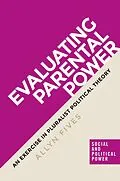Is parents' power over their children legitimate? And what role does theoretical analysis play when we make such normative evaluations? While this book adds to the growing literature on parents, children, families, and the state, it does so by focusing on one issue, the legitimacy of parents' power. It also takes seriously the challenge posed by moral pluralism, and considers the role of both theoretical rationality and practical judgement in resolving moral dilemmas associated with parental power. The primary intended market for this book is advanced undergraduate and postgraduate students and established academics, in particular those with an interest in practical and applied ethics, contemporary political theory, moral theory, social theory, the sociology of childhood, political sociology, social work, and social policy.
Autorentext
Allyn Fives is Lecturer in the School of Political Science and Sociology and the UNESCO Child and Family Research Centre, National University of Ireland, Galway
Klappentext
Is parental power over children legitimate? And what role do both theoretical analysis and practical judgement play when we make such normative evaluations? While this book adds to the growing literature on parents, children, families and the state, it primarily focuses on one issue: the legitimacy of parents' power. It also seriously considers the challenge posed by moral pluralism, and analyses the role of both theoretical rationality and practical judgement in resolving moral dilemmas associated with parental power. The book makes a number of conceptual and methodological innovations. Whilst parental power is usually conceptualised as a form of paternalism, this book shows that non-paternalistic parental power can be legitimate as well. Although such power is often assumed to involve interference with children's liberty, there is in fact a plurality of forms of parental power. And whilst political theorists offer general rules to resolve dilemmas arising between competing moral claims, it is demonstrated here that, in the evaluation of parental power, practical judgements are required in specific cases. A number of such cases of parental power are explored here at length, including parental licenses, children's informed consent, and civic education.
Inhalt
1 Introduction: philosophy, power, and parents Part I: Paternalism and its limits2 Paternalism 3 Caretaker or liberator?Part II: Conceptual and metholodogical issues4 Moral dilemmas5 Children's agency6 Parental power7 Normative legitimacy Part III: The moral legitimacy of parental power8 Legitimacy in the political domain and in the family9 Licensing, monitoring, and training parents10 Children and the provision of informed consent11 Sharing lives, shaping values, and voluntary civic education12 ConclusionIndex
